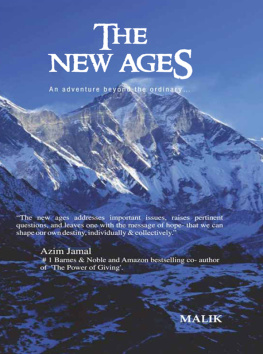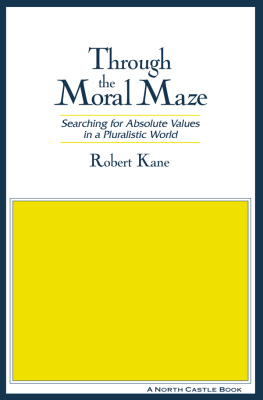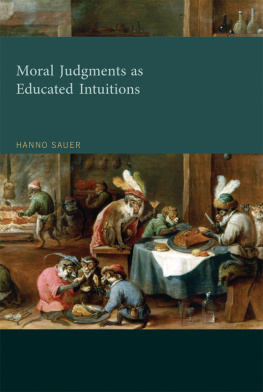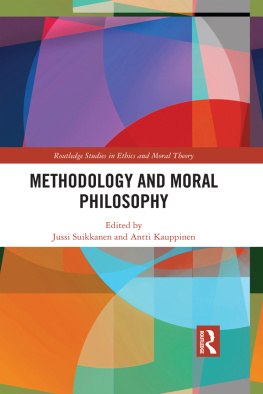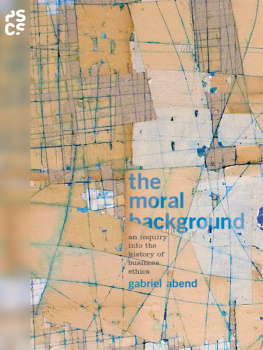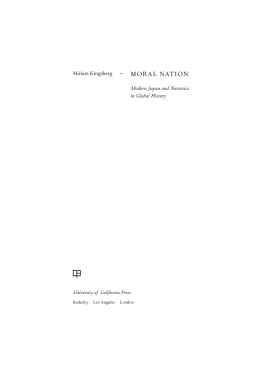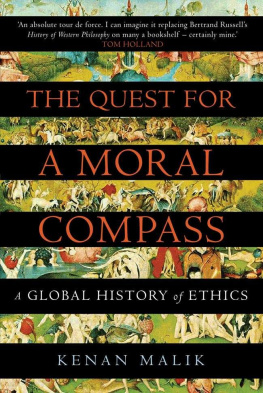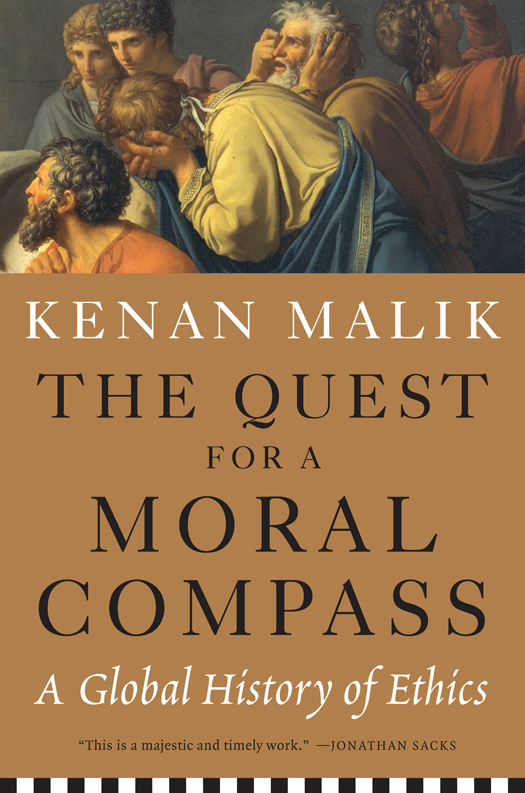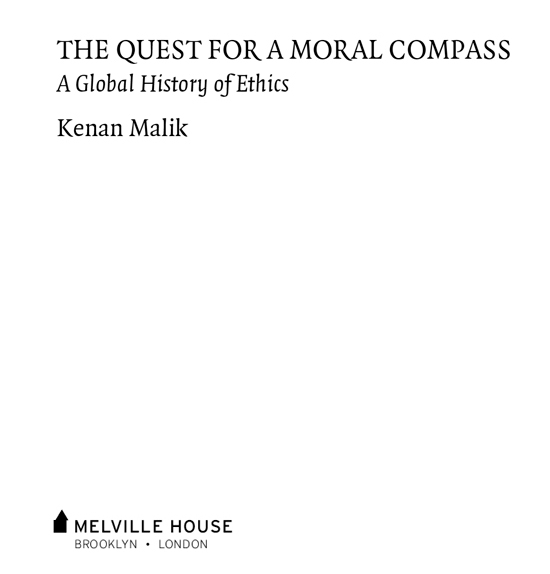THE QUEST FOR A MORAL COMPASS
Copyright 2014 by Kenan Malik
Published by arrangement with Atlantic Books, Ltd
The author and publisher would like to thank the following for permission to reproduce copyright material: Extract from Little Gidding from Four Quartets by T. S. Eliot Estate of T. S. Eliot and reprinted by permission of Faber and Faber Ltd; Extract from Translation by Roy Fuller from Selected Poems (2012) used by permission of Carcanet Press Limited.
First Melville House printing: September 2014
Melville House Publishing
145 Plymouth Street
Brooklyn, NY 11201
and
8 Blackstock Mews
Islington
London N4 2BT
mhpbooks.com facebook.com/mhpbooks @melvillehouse
ISBN: 978-1-61219-403-5
eBook ISBN: 978-1-61219-404-2
Design by Christopher King
A catalog record for this book is available from the Library of Congress.
v3.1
For Maya,
the most moral person I know
(though who will, no doubt, disagree with most of this),
and for Carmen,
whose moral sense already puts mine to shame
Preface
What can the history of morality tell us about the nature of morality? And about ourselves as human beings? These are the questions at the heart of The Quest for a Moral Compass.
For many, the questions themselves might seem absurd. There is a widespread perception of morality as occupying a sphere of its own. We imagine that morality can, and should, be understood in its own terms. After all, if torture is wrong today, then it must have been wrong, too, in the time of Confucius. If abortion is a form of murder, then it must also have been so when Aquinas lived. If charity is a good, then it would have been so in ancient Greece. What, then, can the history of morality tell us about morality? Ideas and cultures and societies may change, but what is morally right and wrong surely remains constant.
There is a deeper worry, too, about historical accounts of morality. It is not just that history can tell us little about it. It is also that to view morality through the lens of history seems to be destructive of morality itself. To understand notions of good and bad, of right and wrong, in historical terms, to view them as having transformed over time, and as having been shaped by a myriad social needs, political desires and material constraints, would appear to undermine the very idea of morality. Values become uncertain, moral lines blurred, norms relative to cultures and ages.
Throughout the history of philosophy, there has of ten been a figure who represented such fears by embodying the assault on morality. One such was Thrasymachus in Platos dialogue The Republic. There are, Thrasymachus observed, many kinds of political systems in Greece democracies, oligarchies, military dictatorships, tyrannies. Each had a different conception of justice, but all benefitted the ruling class. Democracy makes democratic laws, he argued, tyranny makes tyrannical laws, and all declare what they have made what is to their advantage to be just for their subjects, and they punish anyone who goes against this as lawless and unjust. Conventional morality is, for Thrasymachus, a scam, a set of rules invented by one groups to promote its own interests and to keep others in check. Reject the scam, was Thrasymachus advice, pursue your interests rather than the interests of others, and disregard justice whenever you can get away with it. The Republic is Platos riposte to Thrasymachus, an attempt to elaborate what morality and justice truly are.
The figure that haunts the modern consciousness in the way that Thrasymachus preyed upon the minds of Ancient Greeks is Friedrich Nietzsche. Philosophy, for Nietzsche, is not the will to truth but the will to power. Philosophers are cunning pleaders for their prejudices which they baptize truths. Morality is an expression of power, power is an assertion of morality.
Nietzsche is most famous, of course, for declaring that God is dead. He was contemptuous of religion, and of Christianity in particular, for having, as he saw it, infected the healthy body of civilization with the poison of compassion. In On the Genealogy of Morals, Nietzsche also produced one of the first and most striking historical accounts of morality. History affirmed for him his belief that the malaise of the modern world lay in a morality that defended the weak and the docile, and deprecated the aristocratic and the strong. The strongest and most evil spirits, he insisted, have so far done the most to advance humanity.
For many of his critics, Nietzsches amorality, his rejection of God and his historical view of morality are intimately linked. If God does not exist, everything is permitted. Dostoevsky never actually wrote that line, though so of ten is it attributed to him that he may as well have. It expresses the existential fear that many feel about a godless world. Without religious faith, runs the argument, we cannot anchor our moral truths or truly know right from wrong. We will be lost in a miasma of moral nihilism as everyone is free to make up their own minds as to what is right and wrong. Values become a matter of personal preference or political need.
The trouble is, even if you do believe in God, and in divinely sanctioned moral norms, there is still no getting away from humans themselves having to draw the moral boundaries. Consider the Bible. Leviticus accepts slavery. It tells us that if a man commiteth adultery, then both the adulterer and the adulteress shall surely be put to death. According to Exodus, thou shalt not suffer a witch to live.
Few contemporary Christians would accept such commands. Other commands they would accept. In the past, thousands of witches were burnt and millions of people enslaved, because it was believed that God sanctified such practices. Virtually no Christian today would imagine that such actions are consonant with Gods will. It is not that God has changed His mind but that humans have. As societies have transformed, so have moral values. Even today, some Christians, reading passages in Leviticus and in Paul, think that the Bible justifies the execution of gays. Others, reading the Bible differently, insist that practising homosexuals are committing no sin at all. Each reads the Bible in a way that allows them to fit it into their own moral universe, a universe that exists independently of the Bible, and allows every believer to interpret their Holy Book.
The same is true of Muslims. Muslims read the same Quran today as they did 1,400 years ago. Yet they read it very differently, even those who think they read it literally. Contemporary Islamic values are not the same as those of Muhammads time. Nor are they the same for all Muslims today. Jihadi literalists, moderates and liberals all read the same book and come to different moral conclusions. Each interprets the Holy Book differently. To interpret it differently means bringing to their reading already formed moral views about womens rights, homosexuality, apostasy, just war and punishments, and finding in the Quran values that justify those views.
Even Gods words, in other words, are not fixed for all time. Religious injunctions may appear absolute and inviolable but how humans understand them shifts and changes over time. There is no escaping history.
To look upon morality as a historical product is not degrade it. It is, rather, to breathe life into it, to understand morality as a human creation, to recognize it not as a fixed monument but as an evolving story. History becomes a tool through which to discover how values have changed, and why, and what it tells us about our moral lives today. It allows us to ask why Ancient Greek Gods were so immoral; how China managed for more than two millennia to create a strong ethical framework without the need for God; why caste became so important in India; why Augustine, perhaps the greatest of Christian theologians, thought slavery and torture morally acceptable; why the Europe of the Enlightenment was also the Europe of imperial terror; how contemporary claims that science can define moral norms are an echo of the religious the idea that values derive from God. And perhaps, most important, viewing morality through the lens of history can show us why Thrasymachus and Nietzsche are wrong. A historical account might undermine the idea of moral injunctions as absolute and objective. But, as we see in this book, it also reveals new ways of thinking about moral norms as more than merely a matter of personal preference or political need.


